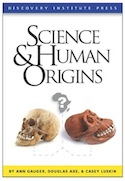 Evolution
Evolution
The Study of Human Origins Remains Unsettled
 So, you think the topic of human origins, reflected in genetic and paleontological lines of evidence, is in fact all zipped up and figured out? That’s what some critics of Science and Human Origins seem to think. They imply that it’s only the lamentable “creationists” (the favored insult term) and “science deniers” who regard basic questions of our origins as far from settled.
So, you think the topic of human origins, reflected in genetic and paleontological lines of evidence, is in fact all zipped up and figured out? That’s what some critics of Science and Human Origins seem to think. They imply that it’s only the lamentable “creationists” (the favored insult term) and “science deniers” who regard basic questions of our origins as far from settled.
How delicious, then, to find the New York Times reporting today on a juicy spat between paleontologists and geneticists. As we’ve pointed out many times before, when it comes to evolution, different lines of evidence have a troubling tendency to point in different directions. So it is here, where the point of contention is whether an archaic human species, something like Neanderthals, was still hanging out in Africa as recently as 25,000 years ago, living next to and interbreeding with modern humans.
Fossil evidence says no. Genetic evidence appears to say yes:
Inquiries into human origins are on strong ground when genetic data and fossil evidence point in the same direction, but at present geneticists and paleoanthropologists have somewhat different stories to tell. All human fossil remains in Africa for the last 100,000 years, and probably the last 200,000 years, are of modern humans, providing no support for a coexistent archaic species. Another team of geneticists reported in 2010 the finding that Neanderthals had interbred 100,000 years ago with Europeans and Asians, but not Africans. This, too, conflicted with the fossil evidence in implying that modern humans left Africa 100,000 years ago, some 55,000 years before the earliest known fossil evidence of this exodus.
In a report still under review, a third group of geneticists says there are signs of Neanderthals having interbred with Asians and East Africans. But Neanderthals were a cold-adapted species that never reached East Africa.
These three claims of interbreeding have opened up a serious discordance between geneticists and paleoanthropologists. For digesting the geneticists’ claims, “sup with a long spoon,” advised Bernard Wood, a paleoanthropologist at George Washington University.
Richard Klein, a paleoanthropologist at Stanford University, said the new claim of archaic and modern human interbreeding “is a further example of the tendency for geneticists to ignore fossil and archaeological evidence, perhaps because they think it can always be molded to fit the genetics after the fact.”
Dr. Klein said the claims of interbreeding could be “a methodological artifact” in the statistical assumptions on which the geneticists’ calculations are based. The flaw may come to light when enough inconsistent claims are published. “Meanwhile, I think it’s important to regard such claims skeptically when they are so clearly at odds with the fossil and archaeological records,” he said.
Dr. Tishkoff said that she agreed on the need for caution in making statistical inferences, and that there are other events besides interbreeding, like a piece of DNA getting flipped around the wrong way, that can make a single DNA sequence look ancient. “But when you see it at a genomewide level, it’s harder to explain away,” she said. [emphasis added]
The occasion for the airing of all this unseemly public disagreement is a report in the journal Cell, “Evolutionary History and Adaptation from High-Coverage Whole-Genome Sequences of Diverse African Hunter-Gatherers.” The details are interesting and worth a read, but more important is the window this opens on divisions in the study of human origins, a field that remains quite unsettled for all that we’re assured to the contrary.
